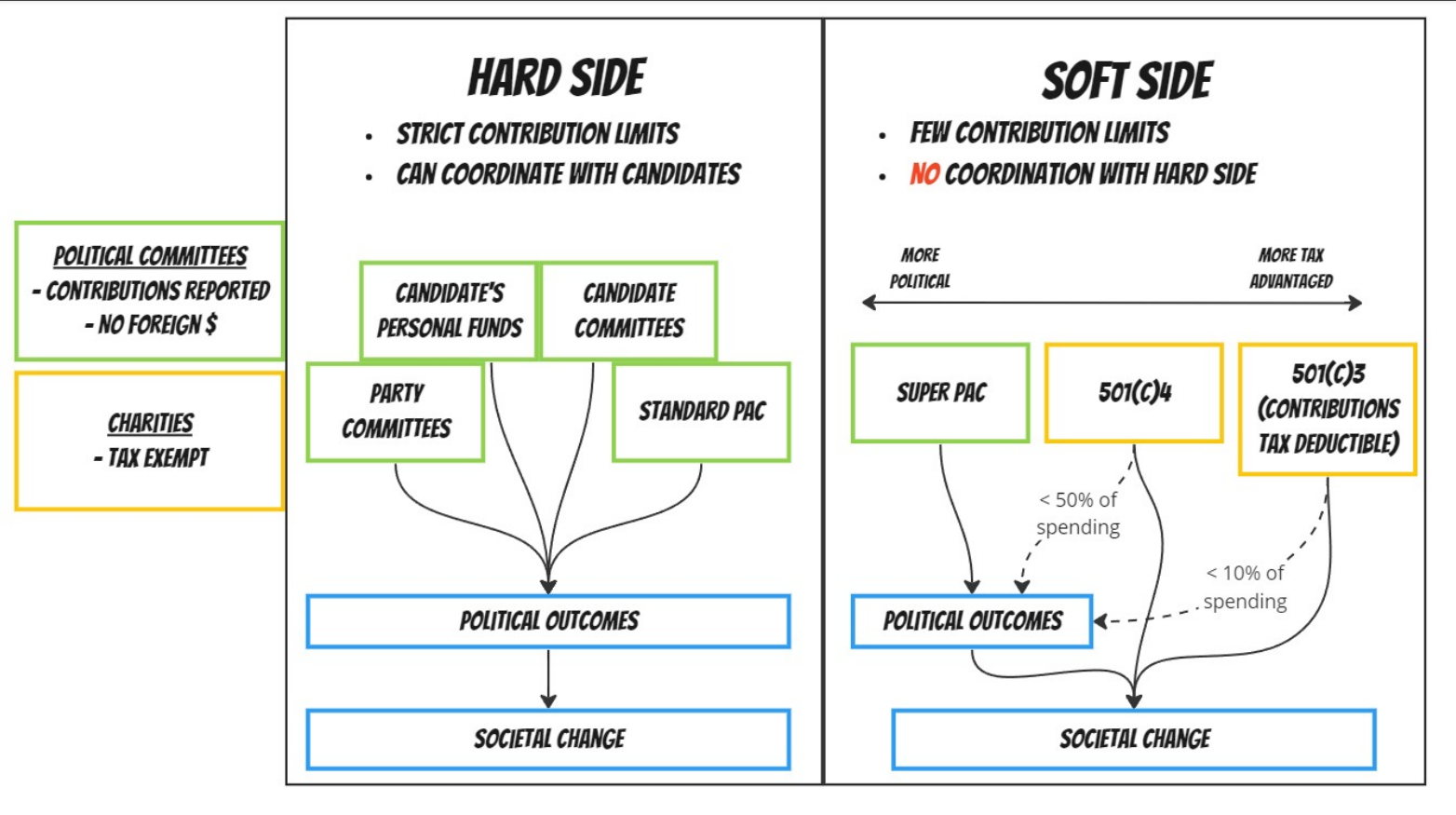501(c)4. SuperPac. Dark Money. If you have been in the space for a minute, you have probably heard these terms thrown around. You may have even googled around the web of terms, but it can be hard to digest without having lived it.
During the ‘24 canvassing season, PV used money from many different buckets, having direct consequence on the day to day lives of those of us in the program. In this article, I'll break down the laws on paper, and share how they impacted our operations.
 A quick breakdown of campaign funding, with full details below. Note
that this applies to federal offices - there are state-specific
regulations for state offices.
A quick breakdown of campaign funding, with full details below. Note
that this applies to federal offices - there are state-specific
regulations for state offices.
The entire goal of political fundraising laws is to prevent bribery and corruption. Nobody can give freely to a candidate - depending on which type of organization you are, different restrictions apply:
Anytime you see massive fundraising numbers, you are looking at a soft-side org. These orgs can do basically whatever they want - put up yard signs, make movies, create and distribute messaging. But they cannot exchange strategic, non-public information with the campaigns.
There are a few cheeky ways around this. Candidates cannot direct specific superpacs on what to do, but they can share public information for what they would want people who support them to do. “Redboxing” is the practice of drawing a gigantic red box around items on your campaign site that you want to draw your soft-side supporters attention to: Demographics that you want them to hit, messaging you want them to use, etc. Redboxing refers to any mechanism that publicly announces what you want superpacs to do.
Committees are a general term for groups that are working to achieve political outcomes:
It's worth noting that any goods and services transferred from one org to another count as a contribution - If you buy a candidate a coffee or order your graphics guy to make a poster for a DNC event, these both count as contributions. Volunteer work you do in your individual capacity is protected free speech, and is never considered a contribution - but if you are exposed to non-public strategic information, and are a decision maker for an organization, this can still cause problems, so it is generally avoided.
Charities are groups that are working to make society better. They are
intended to do this through means other than
electoral politics, but because “everything is
political”, they are a useful vehicle for political change. These orgs are
more limited on the political activity they can engage in than super pacs,
but are more tax advantaged.
So long as you are not acting in a partisan fashion, (using the names of candidates or dates of elections in communications are big no-nos), you can speak freely about issues like drug decriminalization or election participation within your community as a c4 org. Additionally, once you reach that 51% non-partisan spending threshold, you can spend the rest of your budget on openly partisan messaging. If a large amount of spend is done early in the campaign season, like for a large GOTV event, it can get you closer to that 51% spend, and allow you to transition to more partisan messaging sooner.
There is one more key property to charities. Donations to all PACs must be reported, and must be from US citizens. But anyone, including foreign nationals, can anonymously donate to c4 charities. This is referred to as “Dark Money” is a spooky loophole in politics. While c4s that accept foreign donations are absolutely banned from partisan electoral outcomes, they can participate in unlimited lobbying or work on ballot measures - votes for specific policy, as opposed to candidates.
Each of the different organizational structures we discussed has different benefits depending on your goals. Generally, you want to use the most tax-advantaged organization you are allowed to for your project if you are accepting mass donations, and may consider adjusting project scope to allow a more preferable structure to be used. But there is a way to have your cake and eat it too: You can use hybrid orgs to have separate “money buckets”, and pay for different parts of the project with different buckets to get the best of all worlds.
There is also one more organization that we have not discussed: Freely associated citizens, enjoying their free speech protections to coordinate without spending any money, and hence without needing to worry about political finance regulations.
My favorite such org is the DGG political action server, which you should join today!